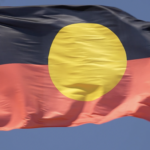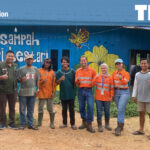
22 Jun UN Water Week 2023 Key Outcomes for Rivers
Less than three percent of the Earth’s water is freshwater. Of that, only 1.2 percent can be used as drinking water, the majority of this is coming from rivers. The World Health Organisation states that each year at least 1.4 million people – many of them children – die from preventable causes linked to unsafe drinking water and poor sanitation. This is a river issue.
Earlier this year, the 2023 United Nations Water Conference took place in New York. Placing water at the forefront of climate action for the first time in nearly 50 years, this event represented a pivotal opportunity to drive achievable and immediate actions to reach SDG6: ensuring the availability and sustainable management of water and sanitation for all. The International RiverFoundation (IRF) attended and presented during two side events at the United Nation Water Conference, shining a spotlight on the largely overlooked agenda of river action.
In an official side event hosted by the International Joint Commission, the IRF presented Key Messages from the 2022 International Riversymposium (IRS), highlighting vital actions for rivers that need to be taken now. Focused on “Enhancing Resilience through Cooperation in Transboundary Waters”, this session illustrated how greater cross-border collaboration will promote more resilient management of shared waters. This is especially true for rivers.
“Rivers are the lifeblood of the land, people and economies they support: if rivers stop flowing, life stops working.”
During the side event titled “Managing River Basins as a System”, the IRF amplified the voices of river experts who presented during IRS 2022. We sketched our vision for thriving and resilient rivers for future generations, which can only be achieved through inter-sectoral dialogue and expanding focus beyond the traditional agenda of WASH to whole-system management. Our key messages deeply align with the growing understanding that river management must extend beyond water supply and sanitation and towards systemic ‘whole of basin change’; a key theme of this side-event.
Climate change complicates and exacerbates the already large challenges of managing river basins. A prominent message from this event was that effective and future-oriented management needs to include the whole basin and its governance, from source to sea and including activities on land. Case studies of ongoing initiatives adopting this innovative approach were presented, including the River Basin Special Policy Study, which closely relates to three of the overarching themes of the United Nations Water Conference:
-
-
-
- Water Development
- Water for Climate, Resilience, Environment
- Water for Cooperation.
-
-
The Special Policy Study is an ongoing program co-led by international knowledge organisations: The Nature Conservancy, The China Council for International Cooperation on Environment and Development (CCICED) and the PBL Netherlands Environmental Assessment Agency (PBL). It is just one of the thousands of initiatives and programs inspiring necessary actions for water.
There is a growing understanding that water action is river action: without rivers, life as we know it ceases to exist. There were many important outcomes for rivers out of UN Water Week New York, including the launch of the Freshwater Challenge, the largest river and wetland restoration initiative in history. While Water Week placed a global spotlight on water, action cannot stop there. It is now our collective responsibility to continue the water dialogue and drive impactful action for rivers all over the world. We need to unite and work together to restore and protect the world’s rivers: our children, our children’s children, and generations to come depend on it.







Sorry, the comment form is closed at this time.